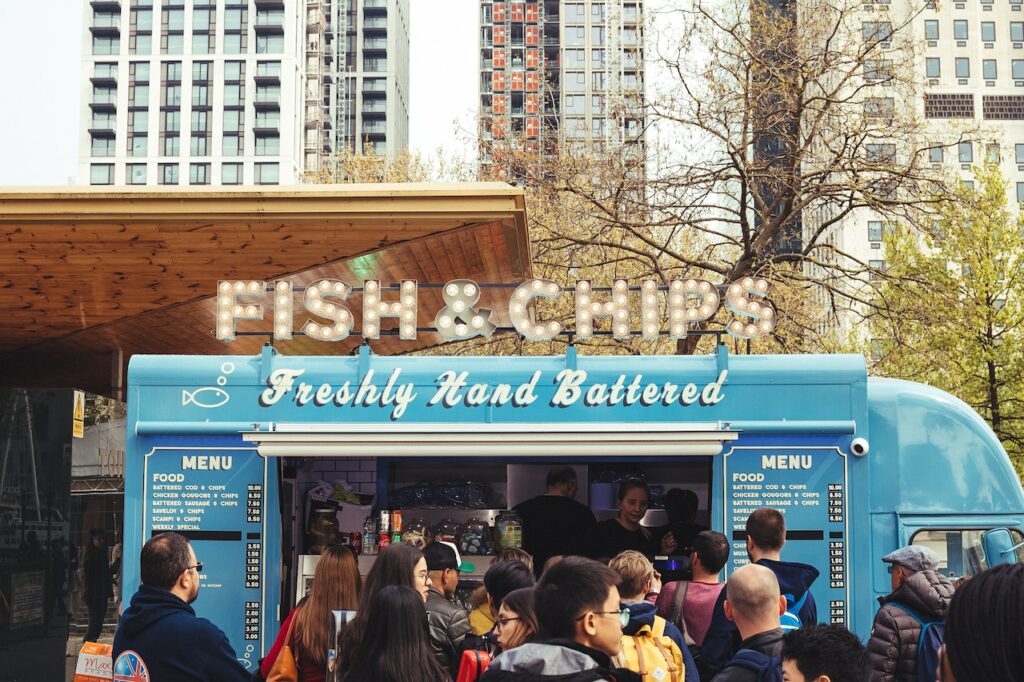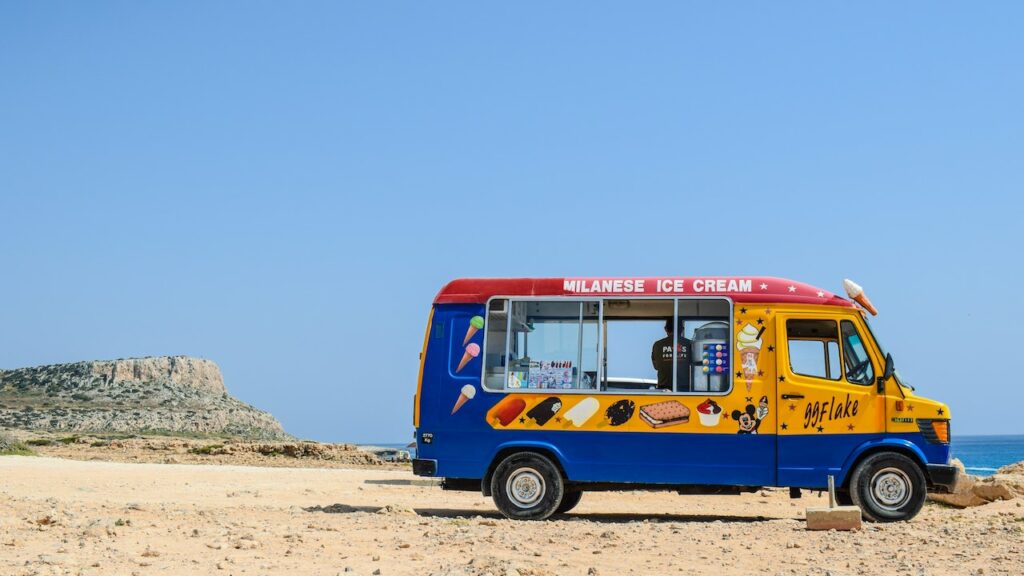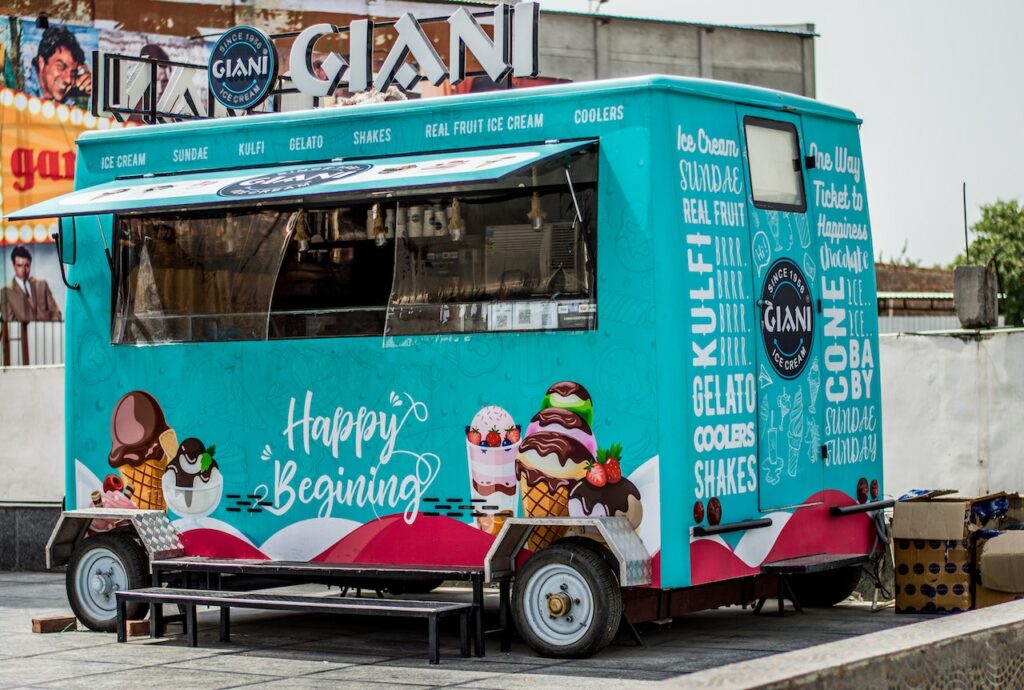Ultimate Guide to Buying & Renting Food Trucks
Food trucks have become famous for entrepreneurs to bring their amazing food to the streets. One important consideration when beginning a food truck business is the expense of owning or renting a food truck. This article will discuss the standard pricing for renting and purchasing food trucks, offering insight into the investment necessary to obtain your mobile kitchen.
*Blastoff creates websites for local food trucks at affordable prices! If you need one for your food truck, contact us!
How Much Does It Cost to Rent a Food Truck

While rental prices can vary from $500 to $15,000 based on some factors, here is a general overview of the average prices for renting food trucks!
1. Daily Rentals
For short-term rentals of a single day, average prices can range from $500 to $1,500. The exact cost will depend on location, event size, cuisine type, and the specific food truck operator. It’s important to note that prices may be higher during peak seasons or for highly sought-after events.
2. Weekly Rentals
Weekly rentals offer a longer-term option, often providing more competitive rates than daily rentals. Prices for weekly rentals can range from $2,500 to $5,000 or more, depending on the same factors as daily rentals.
3. Monthly Rentals
Food truck rental prices typically offer further discounts for extended periods of a month or more. Monthly rental fees can range from $8,000 to $15,000 or more, depending on the duration, location, and other factors influencing the rental market.
It’s essential to communicate directly with food truck operators, discuss your specific needs, and negotiate rental prices based on your requirements. Some operators may offer package deals or custom pricing options depending on the nature of the event or long-term rental agreements.
Factors Influencing Food Truck Rental Prices

1. Duration and Frequency
The duration of the rental period and the frequency of use are critical factors in determining the rental price. Short-term rentals for a single day or a few hours tend to be priced higher per day than long-term rentals spanning weeks or months.
2. Location and Event Size
The location and size of the event can impact rental prices. Highly populated areas with high foot traffic or large-scale events often command higher rental fees due to increased demand and potential business opportunities for the food truck operator.
3. Season and Peak Times
Food truck rental prices may vary based on the season and event peak times. Popular seasons or holidays can witness a surge in demand, resulting in higher rental costs. You should plan your events during off-peak times or negotiate rental prices well in advance to secure a more favorable rate.
4. Cuisine Type and Equipment
The cuisine type and equipment required within the food truck can affect rental prices. Specialized equipment or high-end kitchen appliances may lead to higher rental fees. Additionally, gourmet or fusion cuisine food trucks may charge more due to the complexity and exclusivity of their menu offerings.
Average Prices for Buying Food Trucks

1. Standard Food Trucks
Standard food trucks, typically ranging from 14 to 20 feet in length, can have prices starting from $40,000 to $100,000. These trucks usually have essential kitchen equipment, such as grills, fryers, refrigeration units, and prep stations. The condition, age, and customization level will determine the specific price within this range.
2. Customized and Specialty Trucks
Customized and specialty trucks designed for specific culinary needs or with unique aesthetics can have prices ranging from $80,000 to $200,000 or more. These trucks often feature additional equipment, custom designs, and specialized features to cater to specific cuisines or concepts. You will need to expect high costs for this kind of truck!
3. Brand-New Trucks
New food trucks can cost between $100,000 and $300,000 or more when custom-built to your requirements. With the latest tools and technology, these vehicles have the benefit of being immaculate. However, the cost will change depending on the size, level of personalization, and other features you choose.
4. Used Food Trucks
Used food trucks are a cost-effective option for entrepreneurs. Prices for used food trucks can range from $20,000 to $80,000 or more, depending on age, condition, and equipment. It’s important to thoroughly inspect the truck’s condition and consider potential maintenance costs when purchasing a used food truck.
How to Find a Food Truck

There are several online resources available for sourcing a food truck rental
1. Roaming Hunger
Roaming Hunger’s Marketplace is a great place to start. Based on your area and particular requirements, it offers food truck possibilities. They can also point you in the proper path if there are options. Roaming Hunger provides short- and long-term rent aid, and they have initiatives to help smaller companies. Check it out!
2. Foodtruckrental.com
This website features a comprehensive list of food trucks available for lease.
3. Local food truck owners
Another option is contacting local food truck owners directly to inquire about equipment rentals. They may have equipment available for rent or be able to provide recommendations.
The Cost Breakdown of Renting a Food Truck

1. Initial Investment
Renting a food truck involves an initial investment, including a security deposit and advance payment. The exact amount varies depending on the truck’s location, size, and condition. Food trucks can range from converted vans to fully equipped kitchens on wheels. On average, the initial investment can vary from $5,000 to $30,000 or more, depending on the quality and equipment of the vehicle. Higher-end trucks with state-of-the-art facilities may command a higher upfront cost.
2. Rental Fee
The rental fee forms the core expense when leasing a food truck. The cost of renting a food truck varies based on several factors, including the duration of the rental, location, popularity of the event, and the season. On average, daily rental fees for food trucks range from $500 to $1,500. However, it’s important to note that prices can surge during peak seasons and highly sought-after events. Additionally, longer-term rentals, such as monthly agreements, may offer discounted rates compared to daily or weekly rentals.
3. Maintenance and Repairs
As a renter, you are generally responsible for the maintenance and repairs of the food truck during the rental period. Regular maintenance is crucial to ensure the smooth operation of the vehicle and the equipment within it. This includes oil changes, tire rotations, engine check-ups, and general upkeep. The maintenance cost can range from $100 to $300 per month, depending on the complexity of the vehicle and the frequency of use.
In the event of unexpected breakdowns or repairs, the costs can vary significantly based on the extent of the damage and the need for professional assistance. Budgeting for potential maintenance and a contingency plan to mitigate any unforeseen expenses is essential.
4. Licensing and Permits
Operating a food truck requires obtaining various licenses and permits, which adds to the overall cost. The specific rights and permits needed can vary depending on the location and the regulations set forth by local authorities. These licenses may include health permits, food handler’s keys, and local business permits. The fees for obtaining these licenses can range from $100 to $1,000, depending on the location and the specific requirements.
It’s crucial to research and understands the licensing and permit requirements in the area where you plan to operate your food truck. Compliance with these regulations is necessary to avoid penalties and ensure the safety and quality of the food you serve.
5. Insurance
Food truck insurance is critical to protecting your business and assets from unforeseen incidents. The cost of insurance coverage depends on factors such as the location, vehicle value, and coverage options. Monthly insurance premiums can range from $100 to $500 on average.
The specific insurance coverage for food trucks typically includes liability insurance, which protects against third-party claims for bodily injury or property damage. Additional coverage options may include property damage insurance, equipment breakdown coverage, and loss of business income coverage. The insurance cost may vary based on the level of coverage and the assessed risks associated with your specific food truck business.
6. Fuel and Utilities
Fuel is required for food trucks to function, and the cost varies based on the distance traveled and frequency of use. The price of gasoline is determined by several factors, including the kind of vehicle, the distance traveled, and the engine’s efficiency. Monthly gasoline expenditures for food trucks can range from $200 to $500 on average.
Food trucks may require additional utilities such as power and propane for cooking equipment and gasoline. The price of these utilities varies according to the amount of electricity utilized and the length of operation. The monthly utility expenditures for a food truck might range from $100 to $300 or more, depending on the equipment’s unique requirements and frequency of operation.
7. Inventory and Ingredients
You need to budget for inventory and ingredients to manage a good food truck. The stock cost will be determined by the type of food served, the menu variety, and the estimated number of clients. To reduce waste and maximize expenses, planning and managing your inventory is critical.
Component prices can vary greatly depending on component quality, seasonal availability, and sourcing alternatives. To achieve a mix of quality and price, it is essential to cultivate ties with local suppliers and investigate cost-effective options. While pricing might vary, a food truck’s monthly inventory expenses can range from $1,000 to $3,000.
Summary
Renting a food truck involves various expenses that should be carefully considered when planning a mobile food business or participating in events. The overall cost includes the initial investment, rental fees, maintenance and repair costs, licensing and permits, insurance, fuel and utility expenses, and inventory and ingredient costs.
It’s essential to create a detailed budget and consider these factors to accurately assess the financial feasibility of renting a food truck. By understanding the costs involved, aspiring food truck entrepreneurs can make informed decisions, strategize their operations effectively, and maximize their chances of success in the dynamic and competitive food truck industry.
Conducting thorough research, seeking advice from industry professionals, and staying updated with local regulations and market trends is crucial. Doing so allows you to navigate the costs of renting a food truck and embark on an exciting and potentially rewarding culinary adventure. We hope this helps you today!
*Blastoff creates websites for local food trucks at affordable prices! If you need one for your food truck, contact us!
